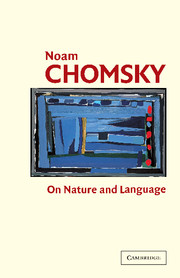2 - Perspectives on language and mind
Published online by Cambridge University Press: 05 September 2012
Summary
It would only be appropriate to begin with some of the thoughts of the master, who does not disappoint us, even though the topics I want to discuss are remote from his primary concerns. Galileo may have been the first to recognize clearly the significance of the core property of human language, and one of its most distinctive properties: the use of finite means to express an unlimited array of thoughts. In his Dialogo, he describes with wonder the discovery of a means to communicate one's “most secret thoughts to any other person … with no greater difficulty than the various collocations of twenty-four little characters upon a paper.” This is the greatest of all human inventions, he writes, comparable to the creations of a Michelangelo– of whom Galileo himself was a virtual reincarnation according to the mythology constructed by his student and biographer Viviani, memorialized in Kant's image of the reincarnation of Michelangelo in Newton through the intermediary of Galileo.
Galileo was referring to alphabetic writing, but the invention succeeds because it reflects the nature of the language that the little characters are used to represent. Shortly after his death, the philosopher-grammarians of Port Royal took that further step, referring to the “marvelous invention” of a means to construct “from 25 or 30 sounds that infinity of expressions, which bear no resemblance to what takes place in our minds, yet enable us to reveal [to others] everything that we think, and all the various movements of our soul.”
- Type
- Chapter
- Information
- On Nature and Language , pp. 45 - 60Publisher: Cambridge University PressPrint publication year: 2002



